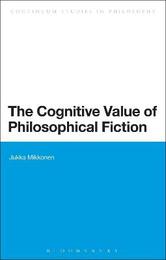
|
The Cognitive Value of Philosophical Fiction
Hardback
Main Details
| Title |
The Cognitive Value of Philosophical Fiction
|
| Authors and Contributors |
By (author) Dr Jukka Mikkonen
|
| Series | Bloomsbury Studies in Philosophy |
|---|
| Physical Properties |
| Format:Hardback | | Pages:240 | | Dimensions(mm): Height 234,Width 156 |
|
| Category/Genre | Literary theory
Analytical philosophy and Logical Positivism |
|---|
| ISBN/Barcode |
9781441154002
|
| Classifications | Dewey:809.001 |
|---|
| Audience | | Postgraduate, Research & Scholarly | |
|---|
|
Publishing Details |
| Publisher |
Bloomsbury Publishing Plc
|
| Imprint |
Bloomsbury Academic USA
|
| Publication Date |
17 January 2013 |
| Publication Country |
United States
|
Description
Can literary fictions convey significant philosophical views, understood in terms of propositional knowledge? This study addresses the philosophical value of literature by examining how literary works impart philosophy truth and knowledge and to what extent the works should be approached as communications of their authors. Beginning with theories of fiction, it examines the case against the prevailing 'pretence' and 'make-believe' theories of fiction hostile to propositional theories of literary truth. Tackling further arguments against the cognitive function and value of literature, this study illustrates how literary works can contribute to knowledge by making assertions and suggestions and by providing hypotheses for the reader to assess. Through clear analysis of the concept of the author, the role of the authorial intention and the different approaches to the 'meaning' of a literary work, this study provides an historical survey to the cognitivist-anti-cognitivist dispute, introducing contemporary trends in the discussion before presenting a novel approach to recognizing the cognitive function of literature. An important contribution to philosophical studies of literature and knowledge.
Author Biography
Jukka Mikkonen is a postdoctorial researcher in Philosophy at the School of Social Sciences and Humanities at the University of Tampere, Finland.
ReviewsJukka Mikkonen contributes a welcome new voice, at once meticulous and creative, to contemporary discussion of what has become known as "philosophy through literature". In The Cognitive Value of Philosophical Fiction intentionalist semantics is shown to be capable of taking significant account both of characteristically literary uses of language and of literary activity as a range of social practices. In part through seeking to defuse the well-known objections, Mikkonen uses this semantics to develop a powerful case for a nuanced version of the claim that certain forms of imaginative literature offer genuine and distinctive cognitive gains, with particular attention to how it is that they do so. -- Martin Warner, Associate Fellow of the Department of Philosophy at the University of Warwick, UK Jukka Mikkonen offers a well-informed overview of the discussion about literature and knowledge in analytic aesthetics and a distinctive theory of his own, pointing to three ways for literary works to contribute to knowledge by communicating truths. This is a sensible and perceptive analysis of one of the classical problems in the theory of literary art. -- Anders Pettersson, Professor at University of Umea, Sweden It would be hard to find anyone better informed than Jukka Mikkonen about recent analytical philosophical debates on fiction and cognition. He is a reliable and perceptive guide to the whole terrain. -- Peter Lamarque, Professor of Philosophy at University of York, UK There is plenty to admire in this elegant little book. It offers one of the most thorough explorations in print of how works of literary fiction can engage in an important kind of philosophical labor. The Cognitive Value of Philosophical Fiction is a must-read for anyone with a serious interest in the intersection of philosophy and literary studies. -- John Gibson, Associate Professor of Philosophy at University of Louisville, USA In short, the book is not only an interesting contribution for readers who are already familiar with the debate, but also a valuable source for those looking for an introduction to the field. -- Wolfgang Huemer, Universita di Parma * Notre Dame Philosophical Review *
|